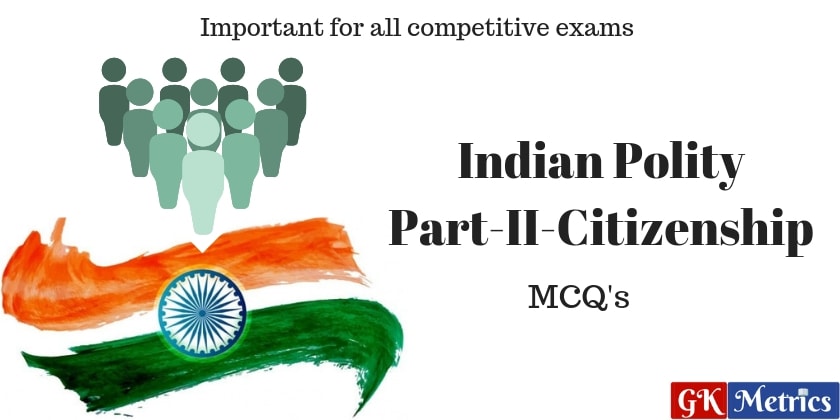Indian Citizenship Article 5-11 is a series of polity MCQ’s, here we provide an introduction about the citizenship of Indian constitution and 40 multiple choice questions with solution. All the MCQ’s are important for all government exams, many of these are repeated in UPSC/SSC/State PCS exams.
Polity: Part 2-Indian Citizenship Article 5-11
Part II (Article / Article 5-11) of Indian Constitution relates to the citizenship of India. In the beginning of the Constitution (November 26, 1949), Article 5 is about the citizenship of India. Article 11 gave power to the Parliament of India to control the right of citizenship by law. Thus, the Citizenship Act 1955 (Citizenship Act – 1955) was enforced by Parliament. This is an act to provide for the acquisition and conquest of Indian citizenship, and after the commencement of the Constitution, the same task is about the citizenship of India.
- Article 5- Be a citizen of India from birth
- Article 6 Citizenship of incoming and outgoing migrants from Pakistan
- Article 7- Individuals who migrate to India from India (Pakistan)
- Article 8- Born in India but lives abroad
- Article 9- Not being a citizen of India on taking citizenship of the foreign state
- Article 10- Continuity of citizenship rights
- Article 11- Legislation to control the right of citizenship by Parliament
Part 2-Indian Citizenship MCQ’s
1. Which are the modes of losing Indian Citizenship?
1) Renunciation
2) Termination
3) Deprivation
A. 1, 2
B. 2, 3
C. All of the above
D. None of the above
[toggle]Ans – c [/toggle]
2. When the citizenship of a person in India cannot be terminated?
A. At the time of emergency in country or state.
B. At the time of war;
C. At election time;
D. None of above;
[toggle]Ans – B [/toggle]
3. Which of the following is not a condition for becoming a citizen of India?
A. Birth
B. Acquiring property
C. Descent
D. Naturalization
[toggle]Ans – B [/toggle]
4. Which of the following is competent to prescribe conditions as for acquiring citizenship of India?
A. Parliament
B. State Legislature
C. President
D. Home Minister of India
[toggle]Ans – A[/toggle]
5. Find the correct statement regarding the acquisition of Indian citizenship?
A. If citizenship of India is to acquired by registration, one-year residence in India is essential.
B. If citizenship is to be acquired by naturalization the person concerned must have resident in India for 5 years.
C. If born in India, only that person can acquire citizenship at least one of whose parents is an Indian.
D. Rules regarding the citizenship of India shall not be applicable to Jammu and Kashmir.
[toggle]Ans – C [/toggle]
6. To acquire citizenship by registration a person must have been resident in India for how many years immediately before making an application?
A. One year
B. Two years
C. Four years
D. Five years
[toggle]Ans – D[/toggle]
7. When a person lost his citizenship in India?
A. When he acquires foreign citizenship;
B. When he renounces the citizenship;
C. When govt. deprives citizenship for some reason;
D. All of the above;
[toggle]Ans – D [/toggle]
8. Dual citizenship is accepted by ______ country?
A. India
B. Russia
C. USA
D. China
[toggle]Ans – C [/toggle]
9. _________ has the power to regulate the right of citizenship in India.
A. Union Cabinet;
B. The Parliament;
C. Supreme Court;
D. High Court;
[toggle]Ans – B [/toggle]
10. In the constitution of India, Article 5 to 11 deals with –
A. Union and its territory;
B. citizenship
C. Fundamental duties;
D. Fundamental rights;
[toggle]Ans – B [/toggle]

